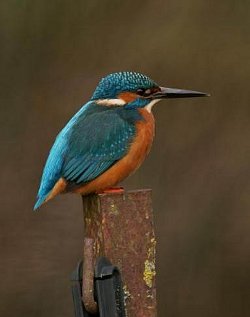Local sightings
Return to the list of reportsJanuary 2012
- 1st
- the first bird of the year to be noted, appropriately, a singing Robin.
- 2nd
- both Tawny Owl and Song Thrush were in song pre-dawn.
- 3rd
- early afternoon was wet, very wet! Over 2" of rain falling in just an hour! Cowslip were in bloom on Station Hill, but had been since late 2011.
- 4th
- Rabbit were obvious about the usual places, the Ashe crossroads area one of the best to observe the 'bunnies'.
- 5th
- further debris was obvious on Parish roads early morning, the overnight winds bringing down many smaller pieces of tree.
- 6th
- a Long-eared Owl was seen in flight over the B3051, Kingsclere road, after dark; this hopefully the first of many sightings in another year of successful breeding in the Parish.
- 7th
- both Rook and Jackdaw were evident later in the day, moving north-east over the village to their still unknown roost site / s.
- 8th
- a Buzzard moved west over the village mid-afternoon.
- 9th
- though much of the Parish wildlife appeared to be suffering from the winter weather, the exotic livestock at Turrill Hill remained ever active, vocal and seemingly happy to be out in it.
- 10th
- another change in the weather provided a mild, dull and rather autumnal day for those about the Parish. c.ten House Sparrow were on feeders in Station Hill, Blue Tit, Robin, Collared Dove, Blackbird and Magpie also to be found visiting gardens there.
- 11th
- both Tawny Owl and Brown Hare were 'trespassing' on Parish roads early morning.
- 12th
- a Little Egret was seen on a dog-walk that took in Southington. Early afternoon saw 13°C being recorded, the highest temperature locally to date this year, and was presumably why a bumble-bee was seen on the wing in Copse Road. Tawny Owl were still / again in song early morning.
- 13th
- further obvious frosts took place at both ends of the day.
- 14th
- a Treecreeper was an unexpected sighting for one. Tawny Owl remained in song, this time being noted late evening.
- 15th
- the WeBS* count at the filtration pools revealed 13 species on site, totalling 87 individuals, that included two Little Egret, a Water Rail, nine Shoveler, 14 Teal and a Grey Wagtail.
- 16th
- Daisy and White Dead-nettle were among the chalk grassland plants already in flower, violets also already making their presence known in some lawns. House Sparrow were again noted in good numbers at Station Hill.
- 17th
- early morning saw the lowest temperature recorded to date this year: -4.7°C! The Test continued to attract Little Egret, Kingfisher and two Grey Wagtail while a garden nest box was seen to be investigated by a pair of Blue Tit.
Right: Kingfisher, Alcedo atthi. "Arthur on a post" - Alan Willis
- 18th
- a Red Kite was over Town Meadow mid-afternoon.
- 19th
- 15 Fieldfare over Woodlands were part of a local increase in numbers of this winter visiting thrush.
- 20th
- Yellowhammer continued to congregate about Turrill Hill hedgerows and trees before moving to roost.
- 21st
- both Winter Aconite and Snowdrop were in bloom in the 'front' garden of Southington House.
- 22nd
- three Red Kite were seen off / over the Kingsclere road between The Harroway and Polhampton Stud early afternoon with another having been seen over the Station Hill / Copse Road area. A Redwing was along Dellands Track, as was a working Ferret!
- 23rd
- Robin remained the most vocal of pre-dawn songsters.
- 24th
- recent reports included a butterfly on the wing in Southington, presumed to be one of the vanessids and probably an overwintering Red Admiral making the most of the more clement weather.
- 25th
- both Tawny Owl and Robin were in song in the milder conditions early on in the day.
- 26th
- both Little Egret and Grey Heron were seen to be using the pools and The Test about Southington on an occasional basis.
- 27th
- a Grey Heron was in The Test off Bridge Street early evening.
- 28th
- the hedgerows of Southington Lane held flowering periwinkle, though these had yet to finish blooming from last year!
- 29th
- mist and seemingly very little else was noted during the early part of the day.
- 30th
- a Red Kite was seen to be lingering over Overton Hill.
- 31st
- both Tawny Owl and Red Kite were being regularly noted about Foxdown, keeping those interested there busy both at day and night with their 'sightings'. A flock of eight Lesser Black-backed Gull moving over the village late afternoon was of note only in that it was heading south-east, an unusual direction for this species to move over so late in the day when movements are expected to be to the north-east, and their gravel pit / reservoir roost sites.

Contributors: Jane Beckmann, Alison Hutchins, Peter E. Hutchins, Jane MacKenzie, Ken MacKenzie, Margaret Rainford, Barry Stalker, Tamsin Williams & Alan Willis.
*WeBS: The Wetland Bird Survey - the scheme which monitors non-breeding waterbirds in the UK. The principal aims of WeBS are to identify population sizes, determine trends in numbers and distribution and to identify important sites for waterbirds.
